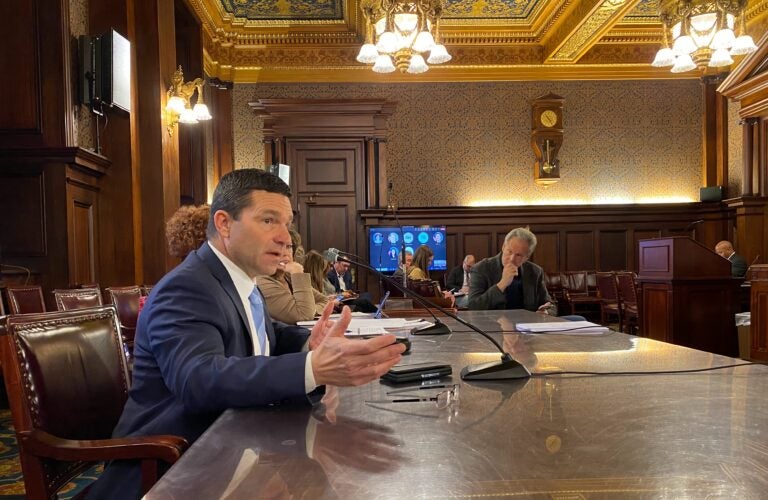A bill to legalize syringe services in Pa. just passed a historic hurdle, but GOP opposition remains
The CDC says new users of syringe services programs are more likely to enter drug treatment. But providers in most of Pennsylvania risk arrest.

State Rep. Jim Struzzi (R., Indiana) says he was initially skeptical of syringe services programs but now believes they can help get people into treatment, reduce the spread of disease, and offer hope. (Ed Mahon/Spotlight PA)
This story originally appeared on Spotlight PA.
In what advocates are calling a historic move, a bill that would legalize syringe services throughout Pennsylvania is making progress in the legislature.
A state House committee recently voted 15-10 to pass a bill that would create an exception to the state’s drug paraphernalia ban for these programs. Syringe services are endorsed by leading medical groups, and the CDC says they reduce viral hepatitis and HIV infections, and that new participants in these programs are more likely to enter drug treatment.
“We’re really excited. This is a long time coming,” Carla Sofronski, executive director of the Pennsylvania Harm Reduction Network, told Spotlight PA. “And we just want every tool in the tool box. We want people to have access to health care and public health interventions.”
Ahead of the Feb. 14 vote, her organization said it would be the first time the legislature has taken a vote on a bill that would authorize syringe services. A Spotlight PA review going back more than 10 years didn’t find any such votes, either. A wide range of public health and recovery organizations in Pennsylvania support expanding the programs.
The state House committee vote follows reporting by Spotlight PA and WESA that examined the conflict over how states should spend the billions of dollars they receive as part of settlements with opioid companies. Settlement documents between those companies and a bipartisan coalition of state attorneys general, including now-Gov. Josh Shapiro, a Democrat, say expanding syringe services should be a priority for the funds.
But Pennsylvania’s drug paraphernalia law hinders that effort. In one recent case, Westmoreland County commissioners pulled $150,000 in opioid settlement funds intended for recovery support services from a rural nonprofit due to concerns about syringe services.
Decades ago, officials in Philadelphia and Allegheny County cited their own public health powers to authorize syringe services. But people operating such programs in other parts of the state lack those protections. To do the work, they often risk arrest and prosecution, operate on small budgets, and are limited in how they can let people know what resources are available.
The legislation passed out of the state House Judiciary Committee on Feb. 14 with only one Republican vote in favor, and the debate there could foreshadow future challenges to getting the bill through the legislature.
State Rep. Paul Schemel (R., Franklin) acknowledged the existing research that shows the benefits of syringe services programs for helping people connect to treatment, but he said authorizing the “very instrumentality of abuse” crossed a line for him.
“I certainly understand the very good intention of this legislation. I even understand the data may support that it does do a net good,” Schemel said. “But because it violates this bright line where we as policymakers would be enabling an evil to achieve that good, that’s a slippery slope, which I cannot go down.”
Other lawmakers pushed back.
“It’s not doing an evil,” said state Rep. Emily Kinkead (D., Allegheny). “It is helping people to get to a place where they are ready to receive recovery. And I don’t think there’s anything wrong or problematic about saying, ‘I want you to live.’”
Another Republican on the committee, state Rep. Tim Bonner of Mercer County, referred to concerns he heard about Philadelphia’s Kensington neighborhood — which has received national attention for years and where the city’s new mayor has committed to shutting down open-air drug markets. He said a resident who testified at a hearing “indicated that needles were everywhere within the neighborhood, that drug users were being drawn to the neighborhood,” and that children were exposed to needles.
“Until I have been convinced that concerns of this nature have been thoroughly addressed, I will have difficulty supporting it,” Bonner added.
State Rep. Joe Hohenstein (D., Philadelphia), who noted he represents a portion of Kensington Avenue, countered that everyone from his district who contacted him about the bill urged him to vote for it.
“There is an impact of this opioid crisis on our neighborhoods in Philadelphia,” Hohenstein said. “And that is why this program is actually needed, because it will allow for safer use.”
Supporters of syringe services programs frequently say they help reduce the presence of discarded needles, and thus protect first responders and the broader public. In a co-sponsorship memo last year, state Rep. Jim Struzzi (R., Indiana) and former state Rep. Sara Innamorato (D., Allegheny) wrote that it “is urgent that our Commonwealth untie the hands of local public health professionals to save lives and reduce the spread of disease related to injection drug use.”
Struzzi’s brother died from a drug overdose in 2014, and the lawmaker has become a leading figure on harm-reduction issues in the Capitol. In 2022, he successfully pushed for the legalization of fentanyl test strips.
“It’s about getting people help,” Struzzi said of syringe services when he addressed the state House Judiciary Committee. “It’s about reducing our overall health care costs and really giving people in Pennsylvania hope.”
A national review last year from the Legislative Analysis and Public Policy Association found Pennsylvania is one of 12 states that does not explicitly or implicitly authorize syringe services through statute or regulation. The American Medical Association supports these programs, and the World Health Organization offers a guide to starting and managing them.
But Pennsylvania drug paraphernalia law says hypodermic syringes and needles are illegal drug paraphernalia if they are used or intended to be used to inject banned control substances.
Under the bill co-sponsored by Struzzi, the state’s definition of drug paraphernalia would not include syringes, needles, or other objects “used to reduce the risk of disease transmission or other harm” provided through a syringe services program. The legislation also would create specific exceptions for those items when provided by pharmacists and health care providers.
Under the legislation, syringe services programs would have to directly provide or arrange a number of services, including access to sterile syringes and needles, safe disposal of the items, information about substance use disorder prevention and treatment, and help obtaining opioid overdose reversal medication.
To become law, the measure still needs to pass through the full state House, where Democrats hold a slim majority, and the Republican-controlled Senate. A spokesperson for Pennsylvania House Majority Leader Matt Bradford (D., Montgomery) declined to say when the bill would come up for a vote in the full chamber. In the state Senate, a spokesperson for Majority Leader Joe Pittman (R., Indiana) declined to comment on the bill.
The Shapiro administration supports expanding syringe services “when administered correctly” and encourages “the General Assembly to pass any legislation that would ultimately increase access to these harm reduction tools in Pennsylvania,” Stephany Dugan, a spokesperson for the Pennsylvania Department of Drug and Alcohol Programs, previously told Spotlight PA and WESA.
The administration supports the legislation that passed out of the state House Judiciary Committee, according to a spokesperson for the governor.
At the committee hearing on Feb. 14, all of the Democratic members voted in favor. Rep. Jim Rigby of Cambria County was the sole Republican to join them.
Struzzi, who is not on the committee, told Spotlight PA afterward that he is interested in addressing some of the concerns his fellow Republican lawmakers raised regarding the legislation, and noted he was skeptical too before visiting Prevention Point Pittsburgh to see for himself how these programs help people experiencing addiction.
“A lot of these people are … desperate, they’re alone, they’re afraid. And these programs bring them in to someone who cares,” Struzzi said. “And that to me is a step in the right direction.”
Sarah Boden of WESA contributed to this article.
 Spotlight PA is an independent, nonpartisan, and nonprofit newsroom producing investigative and public-service journalism that holds the powerful to account and drives positive change in Pennsylvania.
Spotlight PA is an independent, nonpartisan, and nonprofit newsroom producing investigative and public-service journalism that holds the powerful to account and drives positive change in Pennsylvania.
WHYY is your source for fact-based, in-depth journalism and information. As a nonprofit organization, we rely on financial support from readers like you. Please give today.






